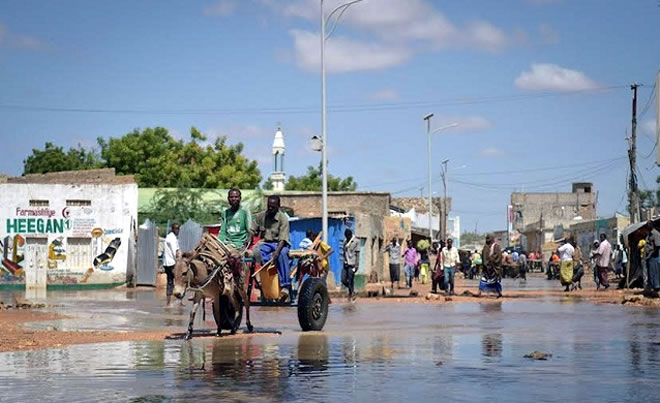Displaced people return, but need additional assistance

Friday, June 24, 2016

People returning to the city. Photo: Tobin Jones/AMISOM
Nearly 70 per cent of the 70,000 people affected by flooding along the Shabelle River in Belet Weyne, Hiraan region have begun to return to their homes according to latest reports from humanitarian partners. However, some remain displaced as their shelters and latrines have been destroyed or remain waterlogged. The return of the displaced to their homes is being driven, in part, by the start of the Hagaa cold season and the delivery of food aid in return areas.
The flood waters along Shabelle River caused extensive damage to crops in Belet Weyne and the surrounding areas and destroyed infrastructure at the local hospital, further worsening the situation at the facility, which has grappled with severe underfunding. There are concerns that the food security situation may worsen in the affected areas in the coming months due to below average rains reported at 82mm by FAO-managed Somalia Water and Land Information Management (SWALIM) and crops destroyed by flooding. The next harvest is expected in August 2016. The cost of cereal has doubled in the last few weeks up from US$0.7 to $1.5, according to the Food Security cluster. Flooding also occurred in Balcaad and Jowhar leading to displacement and destruction of some farmlands and crops. In Jowhar district, 1,140 people were temporarily displaced in Brimo Asento village.
Partners step up response to flood affected people
As displaced families begin to return in the Belet Weyne area, partners are rehabilitating damaged infrastructure, including improvised repairs to broken river embankments to mitigate the impact of future flooding. Water, sanitation and hygiene (WASH) partners supplied 50,000 litres of clean water to over 20,000 people. In addition, 50 communal latrines have been dug in areas where people have been displaced to in order to promote hygiene and minimize the risk of water-borne diseases including AWD/cholera. Over 30,000 people received hygiene kits and water purification tablets. Some 20,000 sand bags were distributed to reinforce river banks and prevent flood waters from affecting more settlements. The WASH cluster is working with communities on hygiene promotion in areas where people have returned. The health cluster established mobile health services in Banaaney, Ceel Jaale and Shiirkaneco and restored operations at Belet Weyne General Hospital. The Food Security cluster distributed one month food ration to over 60,000 people, 10,000 of whom received nutrition supplements.
Some 3,000 people received unconditional cash relief for food assistance. Shelter cluster partners distributed NFI kits to over 33,000 people while 2,400 people received unconditional cash grants to buy the kits. The governments of Djibouti and Saudi Arabia provided food to 9,000 and 15,000 people, respectively. Protection cluster partners distributed 75 dignity kits to people in various displacement centres. Schools are expected to resume in August and the response is focused on rehabilitating school facilities damaged by flooding and to support the Ministry of Education to conduct final examinations.
The Somali Federal Government and the National Drought Committee pledged a total of $150,000 in May for food assistance in Belet Weyne. Already, the National Drought Committee has disbursed $32,000 for food assistance for 7,200 people. Joint post flood assessments by the government and humanitarian partners are ongoing to establish the extent of the damage and assistance needed to facilitate recovery.